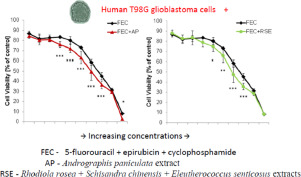Phytomedicine ( IF 6.7 ) Pub Date : 2018-11-06 , DOI: 10.1016/j.phymed.2018.11.004 Ean-Jeong Seo , Sabine M. Klauck , Thomas Efferth , Alexander Panossian

|
Background
Cancer chemotherapy-induced cognitive impairments are apparently associated with harmful effects on physiological functions of brain cells. Adaptogens, are known to exhibit neuroprotective effects and to increase cognitive functions in clinical studies. In our previous study (Seo et al., 2018), we demonstrated that selected adaptogenic extracts significantly attenuate cytostatic-induced regulation of more than 100 genes involved in the activation of neuronal death and inhibiting neurogenesis. Neuroprotective and cytoprotective activities of adaptogens rise the question about their possible impact on cytostatic effects of a chemotherapeutic combination of 5-fluorouracil, epirubicin and cyclophosphamide (FEC).
Aim
The aim of this study was to assess the effects of selected adaptogenic herbal extracts, namely of andrographolide (AND), Herba Andrographidis (AP), Radix Eleutherococci (ES) genuine extracts, their fixed combination (AE), and the combination of three adaptogenic herbs, Rhodiola Radix, Shisandra Fructus and Eleutherococci Radix (RSE) on the cytotoxicity of a fixed combination of 5-fluorouracil, epirubicin and cyclophosphamide (FEC) on neuroglia cells.
Methods
Cytotoxicity of FEC, adaptogenic extracts and their combination with FEC was tested on isolated T98G cells in a wide range of concentrations of all tested compounds.
Results
FEC reproducibly inhibited the proliferation of T98G cells by 50% at concentrations of 5 × 10−1 µg/ml epirubicin, 500 × 10−1 µg/ml 5-fluorouracil and 20 × 10−1 µg/ml 4-hydroperoxycyclophosphamide after 24 h incubation of cells. These concentrations were subsequently used for experiments with adaptogenic extracts. The cytotoxic activity of FEC was not significantly changed in the presence of AND, ES and AE. Furthermore, it was potentiated by AP extract and RSE in concentrations of 0.06–6 µg/ml and 17.6–26.4 µg/ml.
Conclusion
The neuroprotective effect of adaptogens did not attenuate the cytotoxic activity of FEC. Application of cytostatic drugs in combination with adaptogenic plant extracts likely have no impact in cytotoxic effect of FEC. Furthermore, AP and RSE potentiated the cytotoxic effects of FEC.
中文翻译:

趋化因子中的适应原(第二部分):植物提取物对神经胶质细胞化疗诱导的细胞毒性的影响
背景
癌症化学疗法诱发的认知障碍显然与对脑细胞生理功能的有害影响有关。已知在临床研究中,适应原具有神经保护作用并增强认知功能。在我们之前的研究中(Seo等人,2018),我们证明了选择的致适应性提取物可显着减弱细胞抑制作用诱导的对100多个参与激活神经元死亡和抑制神经发生的基因的调控。适应原的神经保护和细胞保护活性引发了一个问题,即它们对5-氟尿嘧啶,表柔比星和环磷酰胺(FEC)的化学治疗组合可能对细胞抑制作用的影响。
目的
这项研究的目的是评估选择的适应性中草药提取物的功效,即穿心莲内酯(AND),穿心莲(AP),山茱E(ES)真正的提取物,其固定组合(AE)以及三种适应性组合的组合草药,红景天,五味子和五味子根(RSE)对5-氟尿嘧啶,表柔比星和环磷酰胺(FEC)固定组合对神经胶质细胞的细胞毒性。
方法
在分离的T98G细胞上以各种浓度范围内的所有测试化合物测试了FEC,适应原性提取物及其与FEC的组合的细胞毒性。
结果
24小时后,FEC在浓度为5×10 -1 µg / ml表柔比星,500×10 -1 µg / ml 5-氟尿嘧啶和20×10 -1 µg / ml 4-氢过氧环磷酰胺的浓度下可再现地抑制T98G细胞的增殖50%。细胞孵育。这些浓度随后用于适应原性提取物的实验。在存在AND,ES和AE的情况下,FEC的细胞毒性活性没有明显改变。此外,它可以通过AP提取物和RSE增强,浓度分别为0.06–6 µg / ml和17.6–26.4 µg / ml。
结论
适应原的神经保护作用不会减弱FEC的细胞毒活性。将细胞抑制药物与适应性植物提取物结合使用可能对FEC的细胞毒性作用没有影响。此外,AP和RSE增强了FEC的细胞毒性作用。































 京公网安备 11010802027423号
京公网安备 11010802027423号